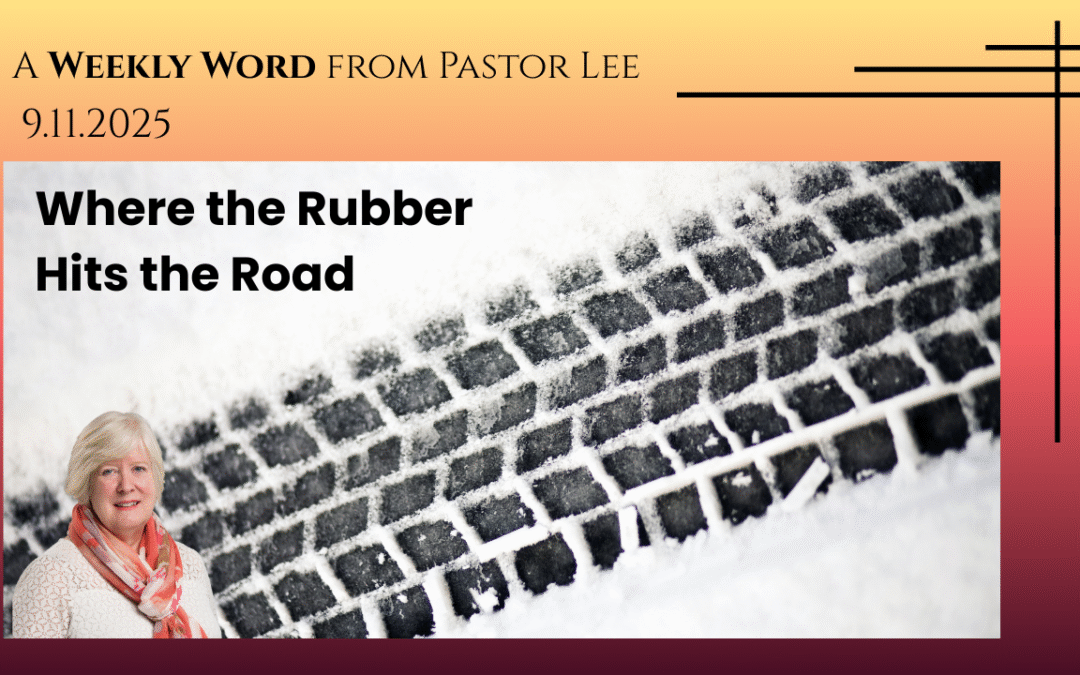We can talk and plan, hope and pray, create committees and set goals. But the real question is what happens when the rubber hits the road. What does all this look like, on the ground? Is it just talk, or are we going to do something with it?
Coming into 2025, we knew this would be a rubber hits the road time. We had just initiated a Site Analysis project that we knew would generate a range of insights and possibilities. And it has! This Sunday we come to the roll-out of our consultants’ recommendations. We’ll be deciding, over the coming weeks and months, whether and how the rubber of these ideas hits the road here at Collegiate/Wesley.
That phrase—the rubber hitting the road—has been, for me, intertwined with questions of faith for many decades. A long-ago pastor would use that phrase in nearly every Bible study. We’d read Scripture, and talk about what it meant, and how it connected to the themes of faith. But eventually, before class was over, this pastor would ask, “So where does the rubber hit the road?” He wanted us to get it that it was never enough to just talk about Scripture, or faith, or ideals of behavior or intention; this was no intellectual pursuit. If all this matters at all, it matters enough to affect what we do on the ground, day-to-day.
I think of this often when I’m preparing my message for Sunday morning. Most weeks I’m pretty certain I can share something interesting, truths that are worth hearing. But will it change anything? Will that particular preaching-rubber hit the road of your lives? or even my own?
It feels to me like we’re living through a time when a lot of rubber is hitting a lot of roads, in our nation. Things that have been said or done in our nation are generating consequences in real people’s lives in the form of a young conservative leader, Charlie Kirk, gunned down on Wednesday, in shootings and lockdowns in way too many of our schools, in immigrants rounded up and taking cover, in voting maps redrawn to achieve, or counter, political partisanship, in countless stories of people demonized because of aspects of their identity, their beliefs, or their political affiliation.
In contrast to that pastor’s fear that we would simply entertain ideas without letting them meaningfully affect our lives, this time in our nation demonstrates the opposite risk: the fallout and costs of too-reactive a response to ideas, especially those that express and breed division, hate, and violence. That rubber has hit the road so very heavily in this season. Are you pondering, with me, where we went wrong, no matter which side of the political aisle we claim?
When we get the balance wrong—from inaction on the one hand to over-reactive on the other—it seems to me the fault lies in the failure of relationship. Jesus gave us this one undeniable command, to love God and to love one another. Love involves a kind of trust that we can act, that we can lean one direction or another and remain in healthy relationships with others who lean differently. It involves us seeing and honoring the incontrovertible humanity and goodness of others at the same time we don’t always agree with their actions. It calls us to choose connection rather than dividedness, and to dwell in peace together whenever possible, while still not denying our own truths of who we are and how God is calling us.
I wish we saw more of that in our nation right now. To be honest, I long for more of that to be true even in my own self.
Which brings me back to this time that we’re in as a church. We’ll soon be figuring out whether and how the rubber hits the road in response to the Site Analysis recommendations. We set as a goal for 2025 that we would “work diligently toward making and implementing strategic decisions about our purpose, future, and direction as a church.” That goal has been part of this work all through this year.
We do all this as people who have chosen relationship with one another—through our membership in this faith community that we share, and through our first allegiance to God through Jesus Christ that (I hope!) even more deeply defines us. Collegiate/Wesley has long been a church unafraid of leaving lasting, visible tracks of love and inclusion, as we’ve claimed who we are again and again. I’m praying that our conversations around what comes next will be suffused by all these truths, and our relationships strengthened by all that happens along the way.


